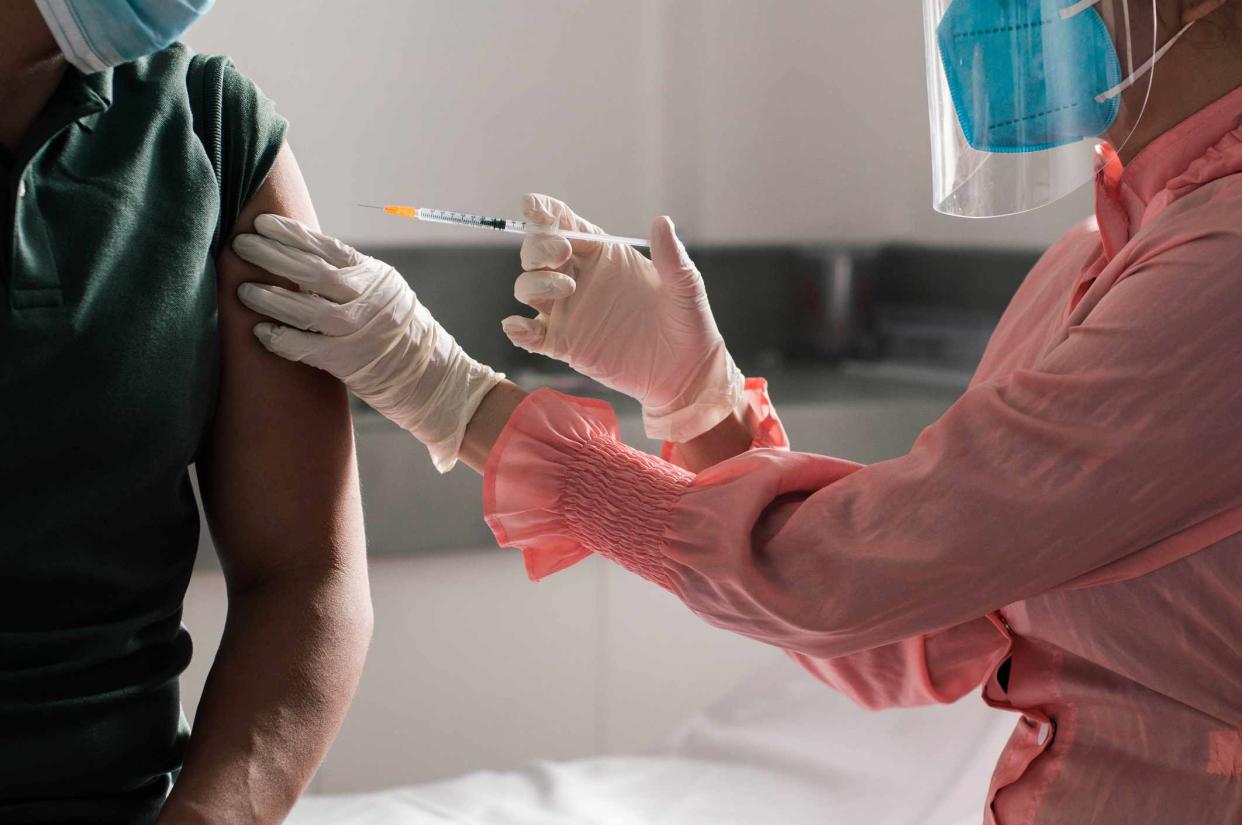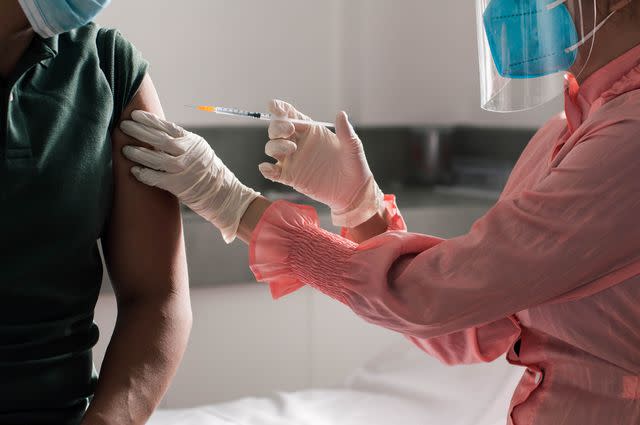Epilepsy and COVID-19 Vaccine: Is It Safe?

Karl Tapales / Getty Images
Medically reviewed by Geetika Gupta, MD
The three COVID-19 vaccines authorized or approved for use in the United States are safe for people with epilepsy. As with all vaccines, there is a risk of side effects, but they tend to be mild. The benefits of vaccination far outweigh the risks.
While people with epilepsy are at no greater risk of getting COVID-19 than people without the condition, some studies suggest that roughly 1 in 20 may experience severe complications if they contract the infection. By getting the COVID-19 vaccine, this risk may be significantly reduced.
This article takes an unbiased look at the effectiveness and safety of COVID-19 vaccines in people with epilepsy. It also provides a general primer on COVID-19 vaccination, including possible side effects, risks, and complications you should know about.

Karl Tapales / Getty Images
Is the COVID-19 Vaccine Safe and Effective for People With Epilepsy?
According to the Centers for Disease Control and Prevention (CDC), the COVID-19 vaccines are safe and effective. Since the authorization of the first COVID-19 vaccine in 2020, millions of people in the United States have been vaccinated under the most intense safety monitoring in U.S. history.
By December 2022, more than 660 million doses of COVID-19 vaccines had been delivered. Of these, severe reactions like anaphylaxis (a potentially life-threatening, whole-body allergic reaction) occur at a rate of only 5 cases per every 1 million doses. The risk of death is extremely low, with only nine deaths identified as being linked to the Johnson & Johnson/Janssen COVID-19 vaccine.
Based on data from the CDC's Vaccine Adverse Events Reporting System (VAERS)—which monitors the safety of vaccines in the United States—COVID-19 vaccines can, on rare occasions, trigger a seizure in people without epilepsy at a rate of roughly 3 cases per every 100,000 doses. This includes febrile seizures in kids, which can occur with other vaccines, such as the flu shot.
As for people with epilepsy, there is currently no evidence that COVID-19 vaccination increases the risk of severe reactions compared to what is seen in the general population.
COVID-19 Vaccine Testing
Although COVID-19 vaccines were fast-tracked to market under Emergency Use Authorization (EUA), they still underwent the same rigorous testing and clinical trials as any other vaccine approved for use in the United States.
Related: COVID-19 Vaccines: How Safety Is Monitored
Which Type Should People With Epilepsy Get?
The three COVID-19 vaccines approved for use by the Food and Drug Administration (FDA) are:
Pfizer-BioNTech COVID-19 vaccine: Approved for adults and children 6 months old and older
Moderna COVID-19 vaccine: Approved for adults and children 6 months old and older
Novavax COVID-19 vaccine: Authorized for adults and children 12 years old and older
The Janssen/Johnson & Johnson vaccine was previously authorized for use in the U.S., but is no longer available after the remaining supply of the vaccine expired in May 2023.
While there are no preferred vaccines for people with epilepsy specifically, the Pfizer and Moderna vaccines—both of which are messenger RNA (mRNA) vaccines—are generally preferred over the Novavax vaccine.
The subunit protein Novavax vaccine is an alternative to the Pfizer and Moderna vaccines. However, the mRNA vaccines are generally more effective against COVID-19 variants.
Related: Difference Between Authorized and Approved Vaccines
Are There Any Side Effects of Taking COVID-19 Vaccines?
All vaccines can cause side effects. With COVID-19 vaccines, some pose a higher risk of side effects than others. Even so, most are relatively mild and short-lived.
The side effects directly result from the body's immune response to the vaccine. While the vaccine itself does not cause disease, it mimics facets of the virus to stimulate the body to launch a defensive response by forming protective antibodies.
While not everyone who gets the vaccine will experience side effects, those who do often have mild flu-like symptoms as a result of the immune response.
The range of side effects can also vary by a person's age.
Age Group | Common Side Effects |
6 months to 3 years old | Injection site pain, redness, and swelling |
4–17 years old | Injection site pain, redness, and swelling |
18 years old and over | Injection site pain, redness, and swelling |
Most side effects occur within seven days of getting vaccinated and may last for a couple of days.
While rare, severe side effects can occur following COVID-19 vaccination, the four most common of which include:
Anaphylaxis: A severe, sudden allergic reaction that can occur with any vaccine
Thrombosis with thrombocytopenia: The formation of blood clots in large blood vessels, most often seen with the J&J/Janssen vaccine
Guillain-Barré Syndrome: A rare disorder in which the immune system damages nerve cells, most typically seen in males over 50 or those given the J&J/Janssen vaccine
Myocarditis and pericarditis: Inflammation of the heart muscle and/or lining of the heart muscle, most often seen in males between the ages of 12 and 24
Related: Common Side Effects of COVID-19 Vaccines
Risks of COVID-19 for People With Epilepsy
People with epilepsy are at no greater risk of getting COVID-19 than people without the condition. Two of the largest studies—one from Korea and the other from Sweden—conducted population-based analyses to determine the risk of COVID-19 in people with epilepsy.
The Korean study involved 212,678 people with a confirmed COVID-19 diagnosis. It concluded that epilepsy increased neither the risk of COVID-19 nor the risk of death from COVID-19.
The Swedish study involved 1,221,801 people with a confirmed COVID-19 diagnosis. It also found no association between epilepsy and the risk of getting COVID-19.
What Should People Avoid Before Taking the COVID-19 Vaccine?
Little preparation is needed in advance of a COVID-19 vaccination. You don't need to stop your chronic medications or any foods you eat.
With that said, some people may be tempted to take aspirin, Advil (ibuprofen), or some other nonsteroidal anti-inflammatory drug (NSAID) in advance of the shot to try to prevent get flu-like symptoms. This is not advised as it is not yet known if the anti-inflammatory effects of an NSAID might alter how well the vaccine works.
COVID-19 vaccines can be given on the same day as other vaccines, including the flu and shingles vaccines. However, people who have received the mpox vaccine (formerly called the monkeypox vaccine) may want to wait four weeks before getting vaccinated as it may interfere with how well the COVID-19 vaccine works.
Contraindications
If you have had a previous severe allergy to a COVID-19 vaccine or have a known allergy to any component of a COVID-19 vaccine, you should not be given that vaccine under any circumstance. Other forms of COVID-19 vaccines may be used, but only with extreme caution.
COVID-19 vaccines should also be used with caution in people with the following conditions:
A history of anaphylaxis to any other vaccines or injectable therapy
A history of a non-severe allergic reaction to a COVID-19 vaccine
A history of myocarditis or pericarditis after a dose of the Pfizer, Moderna, or Novavax vaccine
A history of Guillain-Barré syndrome after a dose of the J&J/Janssen vaccine
Whenever possible, COVID-19 vaccines should be given at least two weeks before starting immunosuppressive therapies (which weaken the immune response), including those used to treat autoimmune diseases.
Related: How to Prepare for COVID-19 Vaccination
Where Do COVID-19 Vaccines Come From?
The four COVID-19 vaccines authorized for use in the United States are created in the lab and developed from these three different technologies:
Pfizer and Moderna COVID-19 vaccines are mRNA vaccines. They contain genetic materials that provide the body with instructions on how to build a harmless piece of the virus called a spike protein. The spike protein triggers the immune response.
Novavax COVID-19 vaccine is a protein subunit vaccine. It contains a COVID-19 spike protein plus a substance called an adjuvant that helps the immune system respond to the spike protein.
J&J/Janssen COVID-19 vaccine is a viral vector vaccine. It contains a harmless piece of an unrelated virus that has been encoded with genetic instructions on how to build a COVID-19 spike protein. However, the J&J vaccine is no longer available in the U.S.
What to Know
COVID-19 vaccines do not change or alter your DNA and do not contain any food proteins or preservatives.
Where Can You Get COVID-19 Vaccines?
COVID-19 vaccines are readily available in most retail pharmacies and community health clinics as well as the medical offices of some pediatric and adult care providers. To find the vaccination provider nearest you, use the online locator offered by the CDC.
COVID‑19 vaccines are free and available to anyone who wants one, even those who are uninsured. You may be asked to show ID or health insurance, but it is not a requirement.
Related: Where Can I Get the COVID-19 Vaccine?
When Should You Take the COVID-19 Vaccine?
COVID-19 vaccination is recommended for everyone age 6 months and older, regardless of whether they've had COVID-19 in the past. Those who currently have symptoms of COVID-19 should wait to be vaccinated until they have fully recovered and no longer need to isolate themselves.
Unlike the flu, there is no "COVID season." Vaccination can be performed year-round per the recommended dosing schedule:
People who are immunocompromised, such as organ transplant recipients, people on chemotherapy, or those with advanced human immunodeficiency virus (HIV) infection, may benefit from an additional Pfizer or Moderna dose.
Related: How Often Do I Need a COVID-19 Vaccine?
Summary
All four COVID-19 vaccines authorized or approved for use in the United States are safe and effective for people with epilepsy. There is no evidence that the vaccines pose any greater risk of side effects or complications in people with epilepsy compared to those without the condition.
A Word From Verywell
The COVID-19 vaccines are effective in preventing severe complications of the disease, but only if you use them. While the vaccination rate in the United States is improving—with just over 80% of the U.S. population having completed the primary series and booster dose as of December 2022—there still remain pockets of hesitancy.
This includes people with epilepsy for whom 1 in 8 were offered the vaccine but refused, according to a 2022 study in the journal Epilepsia Open.
If you are worried about getting vaccinated or are concerned because you have trouble managing your seizures, speak with your healthcare provider to fully understand the benefits and risks. Don't let fear or misinformation prevent you from protecting yourself and others.
The information in this article is current as of the date listed. As new research becomes available, we’ll update this article. For the latest on COVID-19, visit our coronavirus news page.
Read Next: How to Encourage COVID-19 Vaccination
Frequently Asked Questions
Does the COVID-19 vaccine cause epilepsy?
No. With that said, the COVID-19 vaccines can cause a new-onset seizure (meaning the occurrence of a seizure for the first time). This is an extremely rare event, occurring at a rate of 3 cases per 1 million doses. Moreover, new-onset seizures are usually one-off events and do not qualify as epilepsy (a disorder characterized by recurrent seizures).
Does epilepsy make COVID-19 worse?
The simple answer is no. According to the Epilepsy Foundation, people with epilepsy are not at higher risk of getting COVID-19, getting a severe case, or dying of COVID-19. While some people experienced more seizures during the lockdowns, the cause was related more to gaps in medical care and stress (a common trigger for epileptic seizures).
Do I need a COVID-19 vaccine booster?
Yes. Research has shown that the immune protection afforded by the COVID-19 vaccines wanes over time and that a booster shot with mRNA vaccines (Pfizer and Moderna) greatly reduces the risk of severe complications from COVID-19.

